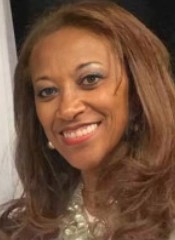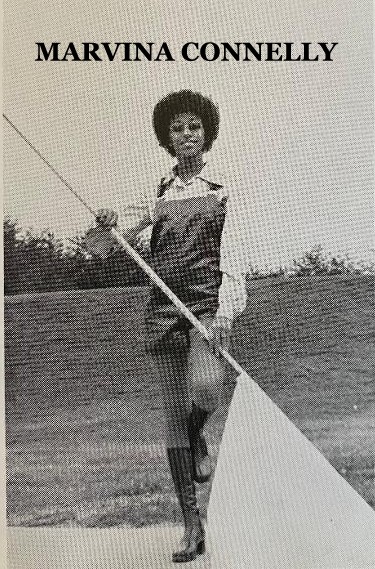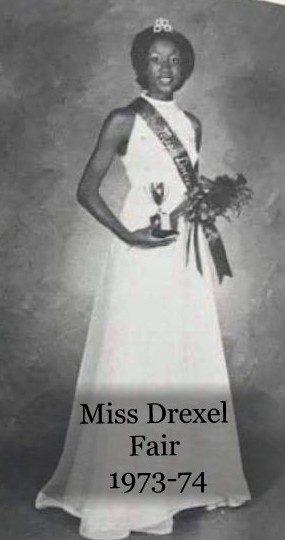|
|

Doris "Marvena" Connelly McCain – Class of 1975
Exceptional Children’s Educator, Raleigh, NC; Customer Service Representative, American Airlines
 Being open to new experiences while at the same time reflecting on past influences seems to work well for Doris Marvena Connelly McCain. Doris recently retired from working as a customer service representative for American Airlines for thirteen years. She also spent most of her career working in various aspects of Exceptional Children’s Education in Burke and Wake Counties. She has also had several other jobs in between, giving her much knowledge and experience in a variety of areas. Being open to new experiences while at the same time reflecting on past influences seems to work well for Doris Marvena Connelly McCain. Doris recently retired from working as a customer service representative for American Airlines for thirteen years. She also spent most of her career working in various aspects of Exceptional Children’s Education in Burke and Wake Counties. She has also had several other jobs in between, giving her much knowledge and experience in a variety of areas.
“I was in the first graduating class at East Burke, so my high school influences were from both Drexel High and East Burke High,” explains Doris. “At both schools, my teachers sparked my interest in so many areas, and throughout my life I have looked back on those experiences. For example, my English teacher, Julia Pittman, was a great inspiration, and much of my career was spent teaching reading and writing. Our band director, Kathryn Siphers, developed my interest in music, and I have used music and songs to teach sentence structure and other aspects of language throughout my career. My senior year, I was co-captain of the band’s drill team, and in later years I put that training to good use. Social studies teacher Terry Childers sponsored the East Burke Black Culture Club, where we learned about important people and events in Black history.
 Being a member of the Anchor Club was also meaningful. The purpose of the club is to perform community service, and I remember how we planned activities with the goal of helping others. French teacher Charles McGimsey was a huge influence. He taught us that there was more in the world than the view out of our window. The idea of traveling to interesting faraway places has always intrigued me, and Mr. McGimsey was able to bring those places to life for us. I began to dream of becoming either a translator at the United Nations or an employee of an airline. We had planned a trip to Paris with our French class, but it never happened. Someday I’ll visit. Another big influence was science teacher, Jerry Murray. Mixing chemicals and working in the science lab made me want to choose a career as a lab technician.” Being a member of the Anchor Club was also meaningful. The purpose of the club is to perform community service, and I remember how we planned activities with the goal of helping others. French teacher Charles McGimsey was a huge influence. He taught us that there was more in the world than the view out of our window. The idea of traveling to interesting faraway places has always intrigued me, and Mr. McGimsey was able to bring those places to life for us. I began to dream of becoming either a translator at the United Nations or an employee of an airline. We had planned a trip to Paris with our French class, but it never happened. Someday I’ll visit. Another big influence was science teacher, Jerry Murray. Mixing chemicals and working in the science lab made me want to choose a career as a lab technician.”
After high school, Doris enrolled at Western Carolina University with plans to study to become a lab technician like she had dreamed of in science class. “One day our class witnessed a tech draw blood from a baby, and it became apparent to me that a career involving blood was not a good one for me. So, when I took a class in abnormal psychology, I became very interested and decided instead to earn my degree in MR K-12 (Mental Retardation – kindergarten through twelfth grade). Later I attended Appalachian State to earn certification in Learning Disabilities.
“While at WCU, I pledged for Alpha Kappa Alpha Sorority, Inc., which is the first intercollegiate African American sorority, founded in 1908 at Howard University in Washington, DC. Today I am active in the Sigma Tau Omega Chapter, which is a graduate chapter of Alpha Kappa Alpha, in the Raleigh area. The motto of these sororities is ‘Service to All Mankind.’ I am reminded of my days in the Anchor Club at East Burke, when we learned the value of community service and put it into practice.
“My mother worked at Western Carolina Center (now called J. Iverson Riddle Developmental Center), so after I graduated from WCU, I went to work there as well. Until that time, my family and friends had always called me by my middle name, Marvena. But since my mother’s name was Doris – as is my first name – the workers there began to call me Doris, too. I’ve been Doris ever since, except for my high school girlfriends who I want to still call me Marvena. We were, and still are, a very close group, and we are so supportive of each other.
“After a year at Western Carolina Center, I realized that working with the profoundly disabled was not the best fit for me and that I would probably prefer public school teaching. I went to work for Burke County Schools, and my first job was teaching at Mountain View Elementary School. Later I became an itinerant teacher who taught at both Mountain View and Oak Hill Elementary Schools. After that my assignment was changed to Mountain View and Salem Elementary. I was somewhat apprehensive teaching at a school without Black students, but it turned out well, and my students won the NAACP Black History Art Contest that year with the theme of ‘Music Through the Ages.’ When we were working on our project, I often thought about some of the activities we had done in the Black Culture Club back at East Burke.
“I went on to teach at other Burke County schools including a year at Heritage Middle School and several years at Hillcrest Elementary School, where I was testing coordinator. Teaching in Burke County was good. I was in the same basic environment where I had grown up. So many people knew my family, and I always felt at home, as did my children. But my brother Marvin, who was at the time working in the Wake County School system, told me that he thought I should explore new territory. He said that my children and I needed new experiences and to learn how to cope in an area where people didn’t know us. I thought his idea had merit, so I moved to Raleigh and began my career with Wake County schools.
“From 1996 until 2000, I taught at Westlake Middle School and then moved to Durant Road Middle School, where I stayed until 2006. Both Durant Road and Westlake are year-round schools. Many of the schools in the Wake County system are year-round. Each year has four tracks with time off in between. This kind of scheduling helps to make better use of the facilities. Some students in the exceptional student’s program are able to function well in a typical classroom environment called ‘in-class’ resource. Along with other teachers, I co-taught language arts, math, science, and social studies in the regular classroom setting. Some special needs students, however, need to be pulled out and worked with individually, and I had a number of those with whom I worked regularly. While I was teaching language arts skills, I often thought of my own teachers, especially Ms. Pittman, who had encouraged me so much in the fields of reading and writing.
“Teaching in the Exceptional Children’s program had many rewards for me. I especially enjoyed helping students identify their individual needs and learning styles. Everyone learns a different way. I discovered that I am more of an auditory learner. Some people are visual learners, and others learn best by doing activities with their hands. I always explained to the students that everyone is better at some things than other things and that finding their strengths would help them cope better with life’s challenges. In a way, everyone has some kind of disability, although it may not be visible to the world, and learning to accommodate weaknesses and build strengths makes life better all around. I often used the movie ‘Rudy’ as a teaching tool. The character in the movie overcomes his dyslexia to become successful in his college career. Sometimes I found that students had been misclassified. Some, as it turned out, didn’t even belong in the Exceptional Children’s program and needed to be re-directed. I’ve always been especially mindful of young African American males. The fewer labels that are placed on them, the better they can progress. Working individually with each student, I was able to identify the appropriate path that he or she needed to take and advise parents of ways they could better help their child succeed.
“While teaching at Durant Road, I served two four-year terms, a total of eight years, on the State Advisory Council for Exceptional Children. It was good to know that my experience helped shape programs for young people and made their lives better.
“Also while at Durant Road, I coached an award-winning step team. Those drill team days with Miss Siphers and the East Burke band really paid off. We competed against other step teams in the area and were consistent winners. We often performed at shows and parades, opened for ceremonies at local colleges, and were featured at festivals. It was great fun and very rewarding. I also felt gratified when some of my step team students decided to study to become teachers in the Exceptional Students program. I also made use of those skills when my daughter was on the color guard at Southeast High School in Raleigh. I became what I call a ‘color guard mom.’ When my daughter was preparing to go to band competition, I could understand the challenge so much better because of the experiences I had during my own high school days.
 “A second job that I had while living in Raleigh was as a retail sales associate at K&G Men’s Warehouse. I started in the women’s department and then later worked in shoes. But my specialty came to be men’s suits. Even after I left K&G, some of the customers still called me and asked if I would help them coordinate their outfits. I also worked for a while as the intake officer for a friend who was the first female bail bondsman in Wake County. I was the person who compiled all the information about the people requesting the bonds. Sometimes I’d have to go with my friend to some questionable areas, and, although it might have looked like something out of a TV show, I let her be the one who got out of the car! I also did a little bit of modeling for the CIAA. A boutique I was working for ran out of models, and they recruited me after they found out I had been a pageant participant. I had enjoyed being in the Miss Organization of Ebony Students when I was at Western Carolina University, and I had actually won the Miss Drexel Fair pageant when I was only sixteen. “A second job that I had while living in Raleigh was as a retail sales associate at K&G Men’s Warehouse. I started in the women’s department and then later worked in shoes. But my specialty came to be men’s suits. Even after I left K&G, some of the customers still called me and asked if I would help them coordinate their outfits. I also worked for a while as the intake officer for a friend who was the first female bail bondsman in Wake County. I was the person who compiled all the information about the people requesting the bonds. Sometimes I’d have to go with my friend to some questionable areas, and, although it might have looked like something out of a TV show, I let her be the one who got out of the car! I also did a little bit of modeling for the CIAA. A boutique I was working for ran out of models, and they recruited me after they found out I had been a pageant participant. I had enjoyed being in the Miss Organization of Ebony Students when I was at Western Carolina University, and I had actually won the Miss Drexel Fair pageant when I was only sixteen.
 “In 2006, I moved from the classroom to the central office of the Wake County school system. As Co-Ordinating Teacher, I wrote reports to the state about funding. For example, when special needs students came to Wake County for the first time, they usually received state funding. I was responsible for writing the reports needed to receive the proper funding for each student. I also performed training for school personnel on matters pertaining to students with special needs. I also served as transportation coordinator. Every special needs student has an Individualized Educational Plan (IEP), and whatever programs are needed for that particular student are listed on that IEP. Some students required special transportation to and from their school facilities, and it was my job to coordinate that. Some students required nursing services, and I arranged that as well. Each IEP lists goals for that student, and I helped to meet those goals. It was also my job to audit the program and make accurate reports to the state. When I first arrived, I found the need for a checks and balances system, so I set that up, making sure that all reports were accurate. “In 2006, I moved from the classroom to the central office of the Wake County school system. As Co-Ordinating Teacher, I wrote reports to the state about funding. For example, when special needs students came to Wake County for the first time, they usually received state funding. I was responsible for writing the reports needed to receive the proper funding for each student. I also performed training for school personnel on matters pertaining to students with special needs. I also served as transportation coordinator. Every special needs student has an Individualized Educational Plan (IEP), and whatever programs are needed for that particular student are listed on that IEP. Some students required special transportation to and from their school facilities, and it was my job to coordinate that. Some students required nursing services, and I arranged that as well. Each IEP lists goals for that student, and I helped to meet those goals. It was also my job to audit the program and make accurate reports to the state. When I first arrived, I found the need for a checks and balances system, so I set that up, making sure that all reports were accurate.
“After my retirement from Wake County Schools in 2011, I worked for a while with beginning teachers in the Exceptional Children’s field, serving as a type of mentor. It was certainly rewarding to help these young teachers get a good start by encouraging them and by giving them advice that I had learned over the years.
“Starting in January of 2008, I took on a second job as a home-based customer representative for American Airlines. I had a church friend, a neighbor, who worked for the airlines, and she brought back my interest in travel. So I decided to apply, and I kept that job for thirteen years. It was very rewarding because I got to help people book their flights, acquaint them with the rules of air travel, and accommodate whatever needs they might have. The biggest challenges came when bad weather or some other issue, the Covid-19 shut-down for example, caused flights to be delayed, and I had to help people find their way to their destinations. But I also got to talk to a lot of people about the places they had been, and I enjoyed that.
“Now that I’ve retired, I hope to do the traveling that I once dreamed of and have talked with so many people about. One example comes to mind. I was celebrating my birthday with friends one year while visiting Los Angeles. As I enjoyed my special treat of crepes and caviar, I thought back on how Mr. McGimsey had spoken of these and other special foods that were not in our usual Southern diet. My next goal is to finally visit Paris, and I, no doubt, will think of him and our French class when I travel there. One of my favorite expressions is ‘once a student, always a student.’ East Burke taught me many lessons that I will always cherish, and I will carry those memories with me as I continue to have new experiences and learn new things.”
Published September 2021
Home Page
|
|
|
|